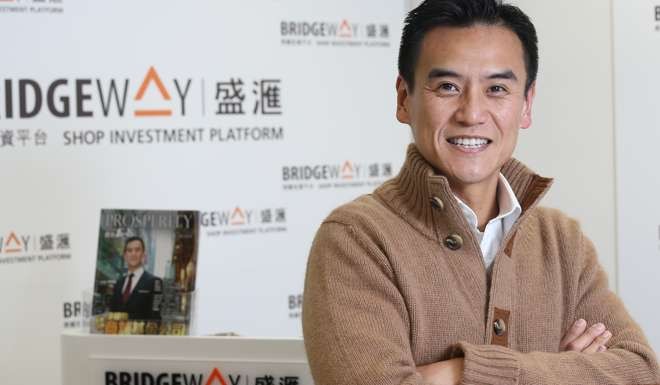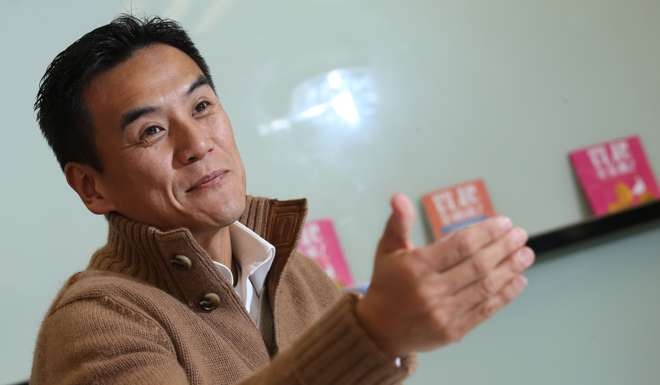
Bridgeway founder Edwin Lee carves niche role in Hong Kong street shop property market
Former investment banker has created HK’s first licensed fund management firm, focused on shops and retail property investment
Edwin Lee is the founder of Bridgeway Prime Shop Fund Management, the first Securities and Futures Commission of Hong Kong-licensed fund management firm focused exclusively on shop and retail property investment.
After two years as an investment banker at Credit Suisse First Boston in New York, Lee found hismself out of a job when initial public offerings sector came to a standstill after the terrorist attack of World Trade Centre in 2001. He then returned home to Hong Kong, and set up Bridgeway.
The firm quickly grew from a one-man band into one of Hong Kong’s leading business startup consulting companies, which mainly focus in building business and reselling them to other entrepreneurs, and had 300 staff.
It completed 1,110 business transactions and transformed 78 start-ups into ready to purchase businesses.
Then in July 2013, he restructured the firm into a solely retail property fund reducing his staff to just seven. He also invited his wife, Rita Pang, then the director and legal counsel at Citigroup, to join the new-look business, as co-founder and counsel to become the eighth employee.
After a two-year application process with the Securities and Future Commission, Lee’s Bridegeway Prime Shop Fund Management was given regulator approval – Hong Kong’s first licensed fund management firm, focused on shops and retail property investment.
The fund’s portfolio contains seven shop properties, worth HK$7.8 million to HK$30 million. Will the fund aim to invest in pricier targets?
Trading in shops worth above HK$50 million is only realistic at times when the economy is booming. More importantly, these types of shop properties are the target of veteran retail property investors, and so its hard to close a deal for really big-ticket transactions of this size.

Who are the investors in the fund’s properties?
Hong Kong-listed Global Mastermind Capital is the fund’s major investor, which has stakes in three out of seven properties. Mastermind is an investment holding company and its subsidiaries are principally engaged in investing in listed and unlisted companies in Hong Kong and the mainland.
Its three properties are a retail shop on Temple Street which cost HK$11.78 million, another costing HK$5.6 million in Kowloon City, and a third worth HK$17 million in Happy Valley. They are jointly held with Bridgeway.
A shop in North Point, which the fund bought for HK$26.3 million, is jointly held with an unidentified chairman of a Hong Kong listed firm. And a unit in Tsim Sha Tsui, we acquired for HK$11.3 million in September, is wholly owned by the fund.
What are your main considerations when you making a purchase?
I have to make sure the final price for the property is 20 per cent below market value. So for a shop worth HK$20 million, we will only pay HK$16 million. The firm raises funding from our investors. We charge 10 per cent management and professional fee for every deal. We will upgrade the shop, if necessary, to maximise the return for our investors by increasing rental income. We believe it will be hard to make an attractive gain if we resell anything short term, so in general we will hold onto investments for two to five years.

What were the main hurdles in securing an SFC license for Bridgeway Prime Shop ?
In 2013, I had focused on trading in retail shop properties and wanted to expand and invest in bigger deals. But only an SFC licensed asset management company can carry out collective investment schemes. You need the licensees to raise the funds to finance larger retail and shop acquisitions.
The biggest hurdle obtaining a license was having to hire two respectable officers who also had SFC licenses and three years’ experience of trading properties. There are only 11 such listed companies doing this, with qualified professionals on board, and so it took us two years to coax two qualified candidates to join the firm. I submitted the application in July, 2015 and obtained the license from the SFC in November the same year.
Why did you want to shift to trading retail properties from being a business broker and builder?
When I returned to Hong Kong, I was thinking of either starting from zero or buying an existing business to reduce investment risk. But I couldn’t find any appropriate businesses for sale at the time, and so I started as an independent business broker.
I helped clients successfully complete around 1,100 business sales transactions. They included tea restaurants (widely known as cha chaan teng in Chinese), flower shops, a private teaching company, cafes, and elderly homes. Later, I also acted as a business creator, or business angel some like to call them. I helped to built 78 businesses which have subsequently been sold.
Some of those were set up by clients who sold their business through me. I have subsequently invited some of them to set up other new businesses, and managed to link them with potential buyers. And found buyers for existing businesses. In that time I rented as many as 10 street shops to build up from scratch and sell. And so gradually, I started realising property investment is one of most profitable businesses around. And so finally I have now shifted all my focus purely onto specialising in trading retail shops.

